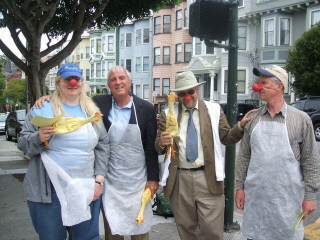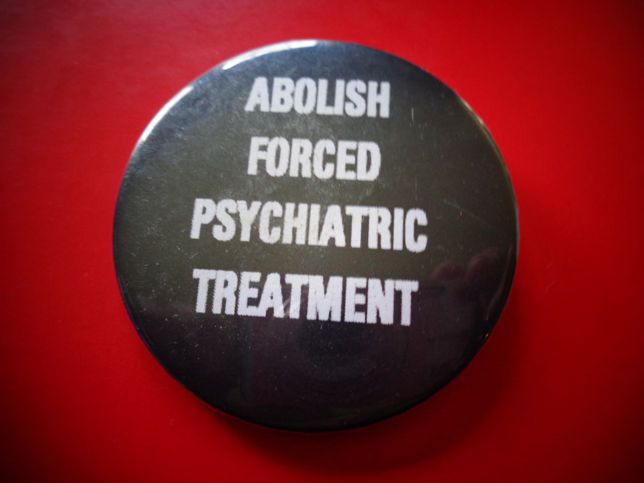Defining Anti-Psychiatry

The late Thomas Szasz in his 2009 and somewhat problematic book Anti-Psychiatry: Quackery Squared accused David Cooper, author of Psychiatry and Anti-Psychiatry (1967), of never having properly defined the term anti-psychiatry. Okay. We can easily remedy that deficit. Let us look at the term, and give it a working definition.
Before we begin, let me mention what I find problematic about Anti-Psychiatry: Quackery Squared. Thomas Szasz in this book of his authorship, lumps all these people together in the anti-psychiatry category, most of whom wouldn't use the word to describe themselves, much in the same fashion that bio-psychiatry authorities lump all sorts of disparate figures in the same bag with Szasz himself. Doing so is, first and foremost, disrespectful.
His first target is methodology different from his own that he considers fraudulent. His second target is left wing ideology. The problem is that dissident professionals in this schema are put on an equal footing with conventional professionals, in so far as damage is concerned, while it is the dissident professionals, such as Szasz himself, who were challenging their profession to begin with.
The greater share of the danger and the problem comes from those who don't question the actions of their profession at all, and who would, therefore, presume to defend it from any and all criticism by silencing critics. Although we can pretend the profession to be beyond fault, suffice it to say, in reality 'it just ain't so'. Psychiatry is not above and beyond its share of mistakes, or even more than its share if that be the case.
Back to defining anti-psychiatry. Before we even begin, let's look at a few of the definitions that are out there. The Google search engine comes in handy when seeking a definition, at least, a popular and accepted definition. put "Anti-psychiatry definition" in the search engine box, hit search, and you will find the beginning of the Wikipedia article on the subject at the top of the search page once it loads. Skip this, for the moment, and we will return to it later.
If we move on down to the definition given at Dictionary.com, you get the Collins English Dictionary definition, which runs as follows: an approach to mental disorders that makes use of concepts derived from existentialism, psychoanalysis, and sociological theory. This definition, to my way of thinking, is thoroughly inadequate and perhaps harks back to the book with which Cooper introduces the subject, Psychiatry and Anti-Psychiatry. Cooper died in 1986, and the intervening years since he introduced the term number approximately 5o. I think we can do better than that when it comes to precision and conciseness, and I will elaborate on this subject as we go.
What passes for the Wikipedia definition at the top of the Google search page is the first sentence in the Wikipedia page on Anti-psychiatry. The Wikipedia definition runs as follows: Anti-psychiatry is the view that psychiatric treatments are often more damaging than helpful to patients, and a movement opposing such treatments for almost two centuries. If this is a vast improvement, it is still far from deserving of any gold star.
The second sentence deals with history, and it could probably be said to be contentious. Psychiatry, the word, goes back to 1808. Anti-psychiatry in it's first pejorative incarnation arrives in 1908, and the year given for the arrival of its second and more positive incarnation would be in all probability about 1966. Sure, there has been a struggle against psychiatry since before psychiatry became psychiatry, but let's leave that out of our definition proper. It's something you might find in a history of the subject, but it's something that would elude even etymology.
The first part of the sentence in the Wikipedia piece is more to the point: Anti-Psychiatry is the view that psychiatric treatments are often more damaging than helpful to patients. This is still a problematic definition. Aren't we talking about medicine in which damaging means injurious and helpful means healing? Are you saying that the treatment is worse than the disease? Qualified, of course, by the word "often". Or are you saying something else? I think it might be helpful if we divided the word into end word and prefix. In other words, if we looked at the definitions of psychiatry itself and then of anti, the prefix, and see what we come up with.
Before we do this, we need to examine something else, the notion that what psychiatry purports to be is at a remove from what it actually ends up being, that is, that there is this disjuncture between the meaning of the word as given in the dictionary and its actual meaning translated into practice. Referencing an article by Thomas Szasz is helpful in this instance. He was very concerned about coercive practices in psychiatry that were more akin to police science than anything remotely medical. He authored an article on the subject titled, appropriately enough for our purposes, Defining Psychiatry.
"Mental disease is fictitious disease. Psychiatric diagnosis is disguised disdain. Psychiatric treatment is coercion concealed as care, typically carried out in prisons called "hospitals." Formerly, the social function of psychiatry was more apparent than it is now. The asylum inmate was incarcerated against his will. Insanity was synonymous with unfitness for liberty. Toward the end of the nineteenth century, a new type of psychiatric relationship entered the medical scene: persons experiencing so-called "nervous symptoms" began to seek medical help, typically from the family physician or a specialist in "nervous disorders." This led psychiatrists to distinguish between two kinds of mental diseases, neuroses and psychoses. Persons who complained of their own behavior were classified as neurotic, whereas persons about whose behavior others complained were classified as psychotic. The legal, medical, psychiatric, and social denial of this simple distinction and its far-reaching implications undergirds the house of cards that is modern psychiatry."
Now that we've suggested that psychiatry is not what it purports to be, let us look at the dictionary definition, that is, what psychiatry purports to be. The definition given at the top of the Google search page when searching for a "psychiatry definition" is somewhat less than what I think you might get out of a standard dictionary: the study and treatment of mental illness, emotional disturbance, and abnormal behavior. I doubt a psychiatrist would be happy with this definition, and so, let us keep looking.
Dictionary.com has a number of definitions, but the first, from Collins again is too close to the definition above, that is, somewhat lacking. The first definition from The Free Dictionary (http://www.thefreedictionary.com) I consider something of an improvement, it is the American Heritage Dictionary 5th edition definition, and it runs as follows: The branch of medicine that deals with the diagnosis, treatment, and prevention of mental and emotional disorders. This is close to the definition given by the American Psychiatric Association: Psychiatry is the branch of medicine focused on the diagnosis, treatment and prevention of mental, emotional and behavioral disorders.
Arriving at a definition for anti, the prefix, is much easier in this fashion. At the top of the Google search page is the preposition, "opposed to; against". Join the two words together, and what have we got: Anti-Psychiatry is against, or in opposition to, and rejection of, the branch of medicine that deals with the diagnosis, treatment, and prevention of mental and emotional disorders. We might, pointing to the disjuncture indicated above, further refine our definition by challenging the validity of the science behind psychiatry. Anti-Psychiatry is against, or in opposition to, and rejection of, the pseudo-scientific branch of medicine that deals with the diagnosis, treatment, and prevention of mental disorder.
There, I think we've got it, a working definition of anti-psychiatry.
Who is this opposition? Although the word itself was coined by a psychiatrist, it isn't owned by psychiatry. More and more former mental patients and survivors of the psychiatric system are calling themselves anti-psychiatry. The idea that we are dealing with a "voiceless" and "vulnerable" population is one that such survivors are fighting, and one of the ways they are fighting it is by using this word that challenges the entire idea of a psychiatric profession. I suppose one could say that the baton has been passed, and now it is time for the "voiceless" to use their voice boxes in opposing systematic oppression and human rights violations. Let us hope some of them are up to the task, and can manage to acquit themselves well enough without being silenced forever, as has happened all too often in the past, by the powers that be.
